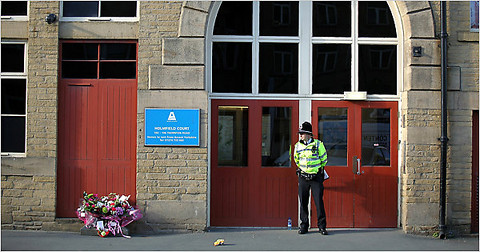As we often lament, every minority or marginalized group can be easily stigmatized, slandered, or reduced by what is not factually correct. How one personally deals with it is a matter of individual preference; I would not dictate terms to anyone if I could. Tactics may differ, but the response does not. Sometimes, despite our best attempts, as the context changes, we wait our turn to be vociferous opponents as well as allies. We live in an age that has good reason to be cynical, but we often go too far, applying it heavily to everything, particularly that which we take offense. Passion is not at fault here, but the volatility of debate is.
Tag: identity
Nov 27 2010
Friday Philosophy: Personal Identity
 We are not confused about our gender. It is other people who have that problem. They confuse who we are with their image of who we should be.
We are not confused about our gender. It is other people who have that problem. They confuse who we are with their image of who we should be.
Would you stand for anyone else doing that to you, for whatever reason?
Transgender people look long and hard into our identities to discover who we truly are. Self-introspection. We don’t look between our legs for that. Human identity is in the mind.
Identity has no material form (Locke: “Consciousness makes personal identity.”). Identity does not reside in the chromosomes or genes.
Oct 08 2010
Young Voters Are Apathetic? Look Closer.
Some incumbent Democrats in danger of being voted out of office are attempting to lean heavily on the youth vote this election. I applaud anyone’s effort to reach out to that particular group, though I have to say the act seems tinged with desperation rather than genuine, lasting outreach. Voting demographics must be cultivated and allowed to flourish with time, not reached for when desperately needed. Considering this attitude, I find it unsurprising that few politicians can rely on such a crucial group. Instead of throwing one’s hands up or lecturing in hopes of creating guilt and shame, I argue that politicians, pundits, and columnists need to look at the subject very differently.
Jun 03 2010
Coming Out as Religious, and Other Stories
I’d rather not entertain current events for a while, and instead tell you a bit more about the Quaker Young Adult gathering I recently attended. Primarily this is because it is supremely depressing to contemplate the oil spill. The beaches on Alabama’s Gulf Coast that I visited every summer as a child and young teen might be forever changed as wave after wave of oil washes ashore. I may return to that at another time, but right now I am avoiding even thinking about it because it hits so close to home. Returning to my original point, there are so many stories to share I hardly know where to begin, but I’ll start with one and go from there.
May 28 2010
I am the crossbow cannibal. My name is Uniqlo.

Uniqlo founder Tadashi Yanai, above, is worth over $9 billion.
From New York Magazine…
Every day, at every Uniqlo worldwide, customer advisers repeat what are known as “the six standard phrases,” which they are expected to use while on the floor.
The first and third “standard phrases” are…
“Hello, my name is Uniqlo, how are you today?”
“Let me know if you need anything. My name is Uniqlo.“
Every office at Uniqlo displays the same poster.
ALWAYS FOLLOW COMPANY DIRECTION.
DO NOT WORK IN YOUR OWN WAY.
And from the New York Times…

A memorial for the three women Stephen Griffiths is accused of killing outside his home in Bradford, England.
In a grisly case that British newspapers have compared to the Yorkshire Ripper murders of the 1970s, the police on Thursday charged a 40-year-old man pursuing a Ph.D. in 19th-century homicides with the murders of three women identified by the police as prostitutes.
One victim was caught on closed-circuit television last week being killed with a crossbow shot to the head before her dismembered body was dumped in a nearby river.
At his arraignment, Mr. Griffiths replied to the standard questions…
What is your name?
I am the crossbow cannibal.
What is your address?
Here, I guess.
Jan 07 2010
An Apology from an Unapologetic Sports Fan
I rarely write about sports because to me they are a fun distraction from more pressing matters, one ultimately of far less importance to the grand scheme of things. To be sure, I’ve always been aware of the base inequalities lurking underneath the surface, whether it be the pro players who make obscene amounts of money to play a game or the college kids who are treated as prized endowment cash cows for their individual universities, colleges, or conferences. Though I watch the games, once they have drawn to a conclusion, I turn off my television or internet feed and go on about the rest of my life. What has always troubled me the most is the extent to which some will pursue the minutia and exacting analysis of fandom, which if applied with even half the effort and half the obsession to a cause that would make strides to say, educate the illiterate or aim to reform a societal malady of choice, would produce impressive results.
Jan 01 2010
A New Year’s Resolution for Activists
In this New Year, I resolve to learn the balance between that which I can positively effect and that which I cannot. I make this resolution not in a desire to shirk my responsibility to my fellow person, but out of the understanding that life is too short to hold myself to a series of arbitrary, exacting rules that remove the joy of daily living. This goes beyond the familiar language of the Serenity Prayer and has application to every activist cause of which I espouse. Though we may be tough on the offenders, we are even tougher on ourselves, and that inevitably leads to burn out and soul-killing cynicism. There is no sin in recharging our batteries periodically or at least recognizing that the greater problems which face us will remain no matter how many hours we devote to their eradication or how intensely we seek to amplify the volume to raise public awareness.
For example, dietary laws were extremely important to the First Century Christians, and indeed in still so in many Jewish and Islamic circles (as well as some Christian ones). Moreover, the idea of unity with God by eating a meal was an integral concept within Jewish, Christian, and Pagan traditions. Those who had converted to Christianity from Paganism were uncomfortable consuming food that had been presented as a sacrifice to Pagan gods and asked for guidance. To this, Paul replied,
Someone may say, “I’m allowed to do anything,” but not everything is helpful. I’m allowed to do anything, but not everything encourages growth. People should be concerned about others and not just about themselves. Eat anything that is sold in the market without letting your conscience trouble you.
I’m not talking about your conscience but the other person’s conscience. Why should my freedom be judged by someone else’s conscience? If I can thank God for the food and enjoy it, why should I be condemned for eating it?
I understand the importance of social justice, particularly social justice through food purchase, which has driven a cottage industry. Organic food, for example, was hippie food first, then became yuppie food. Aside from the obvious, however, it is a curious quirk of humanity that we often cast aside one form of rote legalism for another form of it that closely agrees with our current sensibilities. I know of Atheists who are themselves converts from conservative Christianity and in rightly pointing out the restrictive elements of their upbringing, they then adopt a philosophy of their that is no different in its basic construction. We often focus on that which is intolerant, but living a life dictated too heavily by rules and restrictions doesn’t just eradicate freedom, it also removes the pleasure and fun of life. I firmly believe that life is to be enjoyed. Enough problems exist with our time here on earth than to be further dragged down and burdened by looking for problems. Furthermore, if we focus on law, we adopt a neurotic posture that revolves around ourselves first and foremost. If, however, we focus on unselfish love, then our concern shifts to other people.
This isn’t true just for that which we take into our bodies. Far too often the fear of climate change and global warming leads to its own a kind of legalism that assumes that through an well-intentioned obsession with minimizing our potential damage to the planet that we can somehow fulfill our obligations. Global warming or some form of environmental decay has led some to rush to turn off lights, micromanage the settings of thermostats, and turn noses up at products likely produced by objectionable means. This is, of course, not to say that aiming to be environmentally friendly and less conspicuously consumerist is not worth our time. However, when our lives become Sisyphean to no good end, then we ought to concede that it is our own salvation through works that is predicated on personal conduct that leaves no room for error. If I could teach any lesson to those of us who ascribe to an activist philosophy, that would be it.
In my own life, it is a big temptation to rush to judgment towards those I deem not conducting their own affairs in the manner in which I demand they should. In particular, among online activist forums, a kind of extreme skepticism takes hold among participants. It stems from a collective understanding of just how easy it is to pull the wool over the eyes of the ignorant and the ill-informed, and with it comes understandable feeling of despair that nothing one can possibly do will change that fact. Still, if we adopt that stance, we are assuming that people are forever prisoners of their fate and that they can never change for the better. Even though many may never revise their beliefs and may cling to that which we deem unenlightened and maddeningly stupid, we must never forget that there is always a chance that some may see the light. Perhaps it is we who must modify our expectations and take a more realistic position regarding our poor power to add or detract to the tally.
A year or so ago, I taught an online course of American History to technical college students. My students were predominately working class, blue collar toilers who were seeking to further their education by means of attaining certification to achieve a specific higher paying vocation. They were far from the typical college freshmen of which I had once been. With my middle class education and background, I recognized quickly that it was highly unlikely that I would have ever befriended even one of my students, nor gravitated towards the same things as they in my own life. At the beginning of the course, the views of many of my students were identical to those that Progressives often lament or caustically dismiss as hopelessly backwards or offensively naive.
Yet, after I was fortunate enough to really engage and reach my students, I noticed many of those old prejudices were being openly challenged and few were resisting this exercise in liberty and personal freedom. I never sought to change anyone’s mind, but what I did note with much satisfaction is that until that instant, no one had ever bothered to expand and broaden their understanding beyond soundbytes and inexact, hackneyed rhetoric. Once the complexities of human nature and historical reality became known to them, one could almost observe the metaphorical light bulb going off. It was a thrilling thing to observe for me, the instructor, and after I took some degree of pride in my hard work, I recognized again how much class differences and economic disparities go into forming a concept of identity and system of belief. Many of those who may have thus far taken a completely opposite political stance to mine never had the opportunities I had. What I often find most frustrating among those who consider themselves worldly and intelligent are that they are usually the most stubbornly intractable regarding entertaining the notion that they could be wrong or that their own personal canon of wisdom might not be as airtight as they claim it is. Those who, like my students, almost have a hero worship of the educated are much easier to enlighten and empower, though with that blank slate comes its own set of responsibility and ethical conduct.
Jesus spoke to those who felt as though they knew-it-all,
Then he said to them, “I can guarantee this truth: Unless you change and become like little children, you will never enter the kingdom of heaven. Therefore, whoever humbles himself like this child is the greatest in the kingdom of heaven.
This is not to imply that I am infantilizing my students in some kind of exercise of mock pious Paternalism, but rather to note how much easier it is to open the minds of those who have not kept theirs resolutely snapped shut. We are never too smart, nor too old to learn or to be taught a lesson. Elitism begins to creep in whenever we act or think otherwise. Elitism is a enemy of Progressivism as sure as any of the well-documented offenders that never leave our radar screens. Constructing hierarchies of influence locks out those who wish to belong and want a spot at the table. Who cares if they don’t fit the profile up front! So what if they can’t write a brilliantly crafted blog entry or propose some pithy statement in comments! If we, myself included, were a bit more patient with each other and embraced the idea of a loving family rather than as an outlet for people who desperately want their own views to be validated in a public forum, then we might be making some serious progress. No one doubts how desperately we seek and need a community and how many of us find it within activist political circles, but the shortcomings and the problems cry out for reform just as badly as any number of the worthy causes we demand be addressed.
This then, is my greatest New Year’s Resolution,
When they had finished eating, Jesus said to Simon Peter, “Simon son of John, do you truly love me more than these?” “Yes, Lord,” he said, “you know that I love you.” Jesus said, “Feed my lambs.”
Jesus repeated the question: “Simon son of John, do you love me?” “Yes, Lord,” Peter said, “you know I love you.” “Then take care of my sheep,” Jesus said.
The third time he said to him, “Simon son of John, do you love me?” Peter was hurt because Jesus asked him the third time, “Do you love me?” He said, “Lord, you know all things; you know that I love you.” Jesus said, “Feed my sheep.”
Jun 07 2008
Friday Philosophy: Looking back at the present

The WeaveMothers agreed with a request to vibrate a string. They were whole as well as individual.
Maybe the unit would understand.
Imagine a future. In my future, you would choose a good one, one good for coexistence on this planet as long as we all have to live here.
See if you can act so as to turn reality towards that future. Plan. Create or discover the necessary resources. Shape a scheme.
Set up the dominoes, as many as you can build, and try to find the words that will generate the change you seek. You will undoubtedly fail. Analyze feedback. Loop. Hope for convergence. Better yet, design for it.
May 31 2008
Friday Philosophy: Nebulous answers to cogent questions

The WeaveMothers were one and several. The collective imagined a HereNow. But the autonomous units were going to do what autonomous units do. The distance between imagination and image on the one hand and reality on the other was immense through the eye of any disinterested observer.
As if there existed such a concept as disinterested observer…
It started out in the comments to one of my essays. I have rewritten the comments just a bit for the purposes of readability.
so,
1. is there abandonment of the gender identity you, Robyn, had before your surgery?
2. and a full embrace of the gender you had surgery to become?
3. or is there a sense of identity with both genders,
4. or this there an identity awareness of a new, blended gender?
and the reason i mentioned this belonging in your Friday essay was due to the quote pulled from Friday’s essay that prompted these questions. you notice, i hope, that i’m finally taking you up on your offer to answer questions, Teach!
– kj
So I respond, with full knowledge that sharing even this much diminishes the probability that venturing inside will happen…
